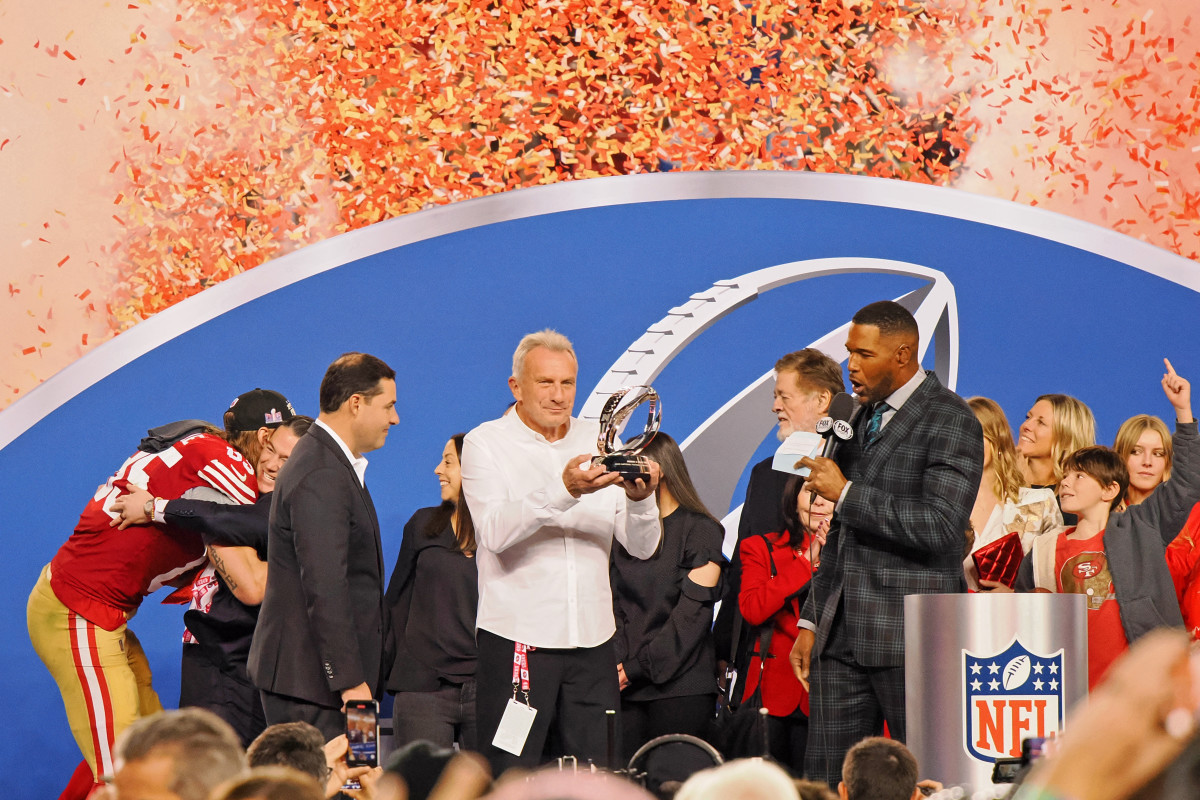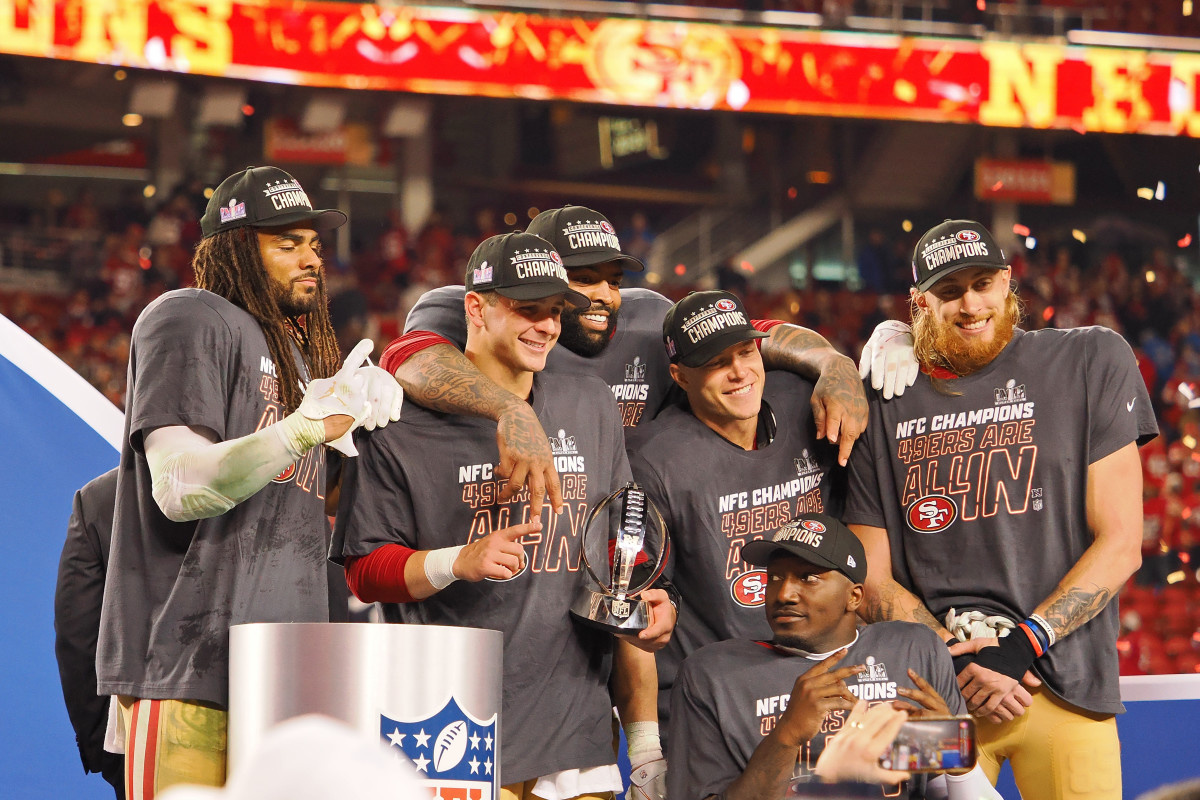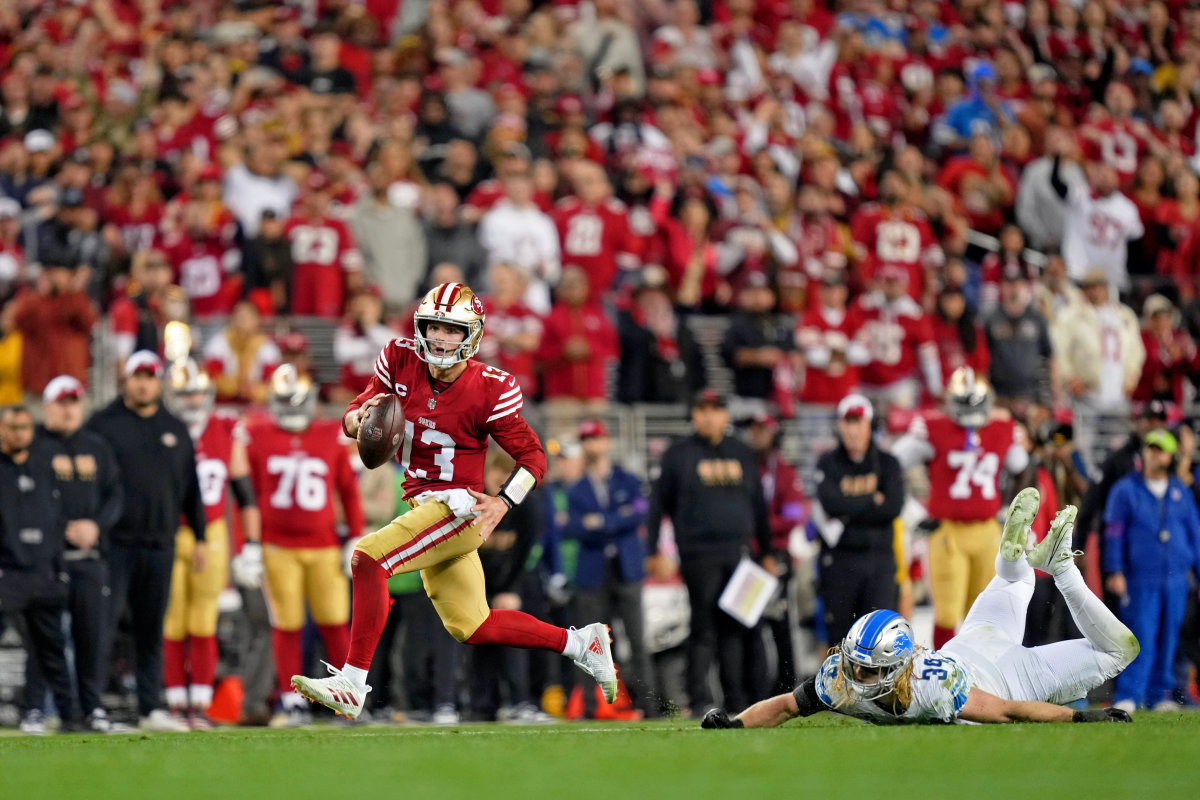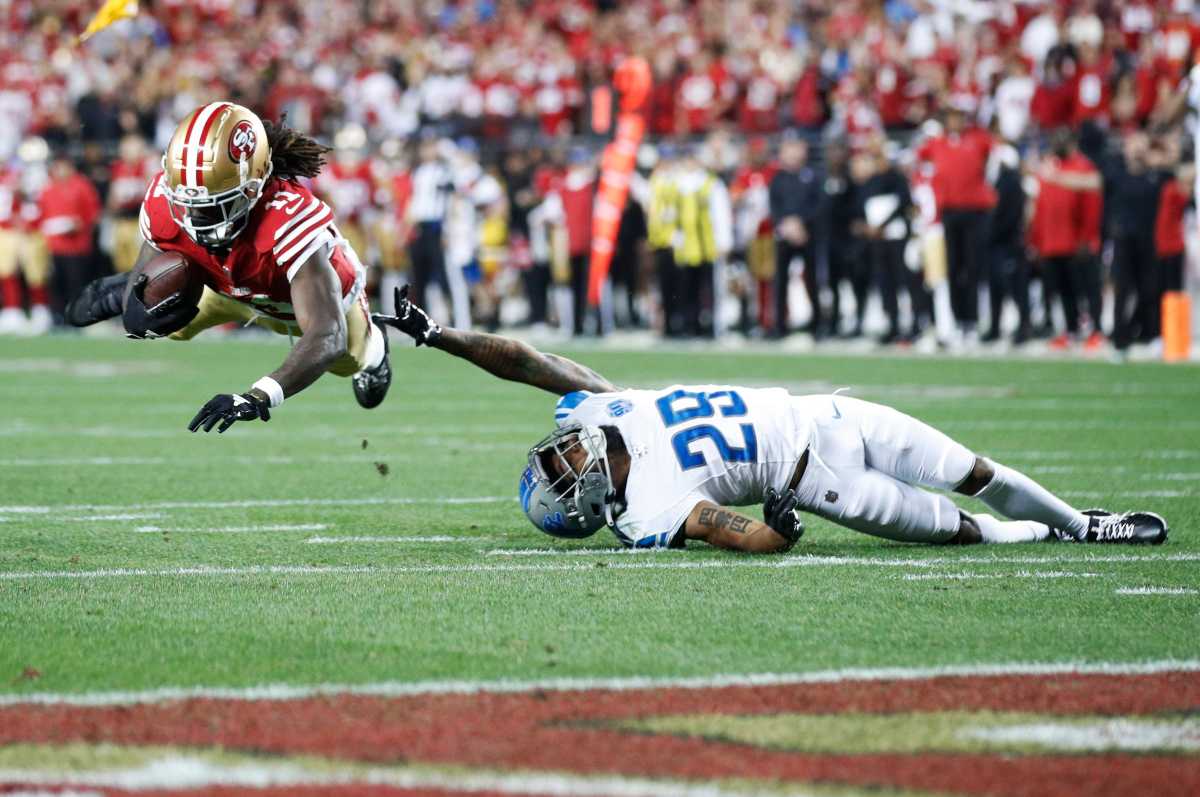Brock Purdy Is the Right QB to Take 49ers Past Their Super Bowl Caveat
In 1957, two professional football teams met for a playoff game in northern California. Just like this year, it pitted the San Francisco 49ers against the Detroit Lions. Just like this year, a berth in the league championship was at stake. Just like this year, the home juggernaut was favored.
This was 1957: San Francisco dominated early, taking a 24–7 lead into halftime. Detroit rallied, scoring three touchdowns (plus one field goal) and limiting the Niners to three second-half points. The Lions won, 31–27 (Detroit’s last road playoff victory), en route to the franchise’s fourth and most recent pro football championship.
This was 2024: Detroit dominated early, taking a 24–7 lead into halftime. San Francisco rallied, scoring three touchdowns (plus two field goals) and limiting the Lions to seven second-half points that came far too late. The Niners won, 34–31, en route to … well, they’ll find out soon enough.
Maybe the reverse symmetry on this Sunday, some 66 years later, marked no more than coincidence. Or maybe it signaled what’s upcoming. But in a game so rich with history, and so rife with historical implications, the hosts might as well have placed textbooks next to programs. Whatever happened figured to be memorable, either way.
Memorable, in this instance, marked a zero-sum exercise for two franchises who reside at opposite extremes on the spectrum of professional football success: the 49ers, tied for the third-most championships with five, and the Lions, one of four teams to never make a Super Bowl. One could upend decades of recent disappointment. Both would give themselves a chance to triumph in the game that matters most, whether vying for their sixth title—to tie the Pittsburgh Steelers and New England Patriots for the most ever—or their first.
The ‘who’ changed dramatically over the course of Sunday afternoon, as disaster led to silence until euphoria threatened to rupture eardrums. Niners fans near tears cursed at Journey’s halftime show, when “Don’t Stop Believin’” played less like an anthem of hope and more like a mocking soundtrack to another conference title game defeat. But not so later Sunday night, after the sun dropped, Detroit withered and San Francisco pounced.

There stood Joe Montana atop a stage, holding the George Halas Trophy in both legendary hands. Smoke swirled. Fireworks exploded overhead. Confetti fell in sheets like rain had a week earlier. The largest comeback in conference championship history had just unfolded, and while owner Jed York thanked The Faithful, his coach, Kyle Shanahan, could only shake his head.
“We played as bad in the first half as we could,” he said.
Nobody ever said it would be easy. And nobody knows that better than Shanahan, the coach who has guided one of the NFL’s most complete rosters for the past several seasons, his brain among the most gifted to ever scribble plays onto a whiteboard. And, still, not a Super Bowl champion as a head coach.
Not yet.
As The Faithful descended on Levi’s Stadium for another conference championship Sunday, they believed—or hoped, or wished—this time would be different. More like 2019 and less like ’21 and ’22. Better yet: more like 49ers teams from the ever-more-distant past, bound for another Super Bowl, roster stuffed with talent, dominance expected.
The most obvious signs pointed toward San Francisco. The left shoulder of wideout-slash-catalyst Deebo Samuel had healed enough for him to play, in front of a sold-out home crowd, for the NFC’s top seed and—a huge difference between this season and the previous two—with a healthy starting quarterback throwing the football. Even the weather seemed to smile on the Niners, with the rain that limited their offense in last week’s victory over the Green Bay Packers replaced by mostly sunny skies and friendly clouds, the temperatures (around 70 degrees) downright balmy.
Detroit didn’t just tamper those good vibes emanating all over northern California. They took a sledgehammer to them, then took a sledgehammer to any slivers of hope remaining. The Lions scored their first touchdown (Jameson Williams, 42-yard run, playing matador to a defense of intimidating bulls) not even two minutes in. They scored their second (David Montgomery, 1-yard plunge) near the end of the first quarter. They intercepted Brock Purdy and forced a missed field goal from Jake Moody, the 49ers rookie kicker.
Other than allowing one San Francisco touchdown—the drive powered evenly by the most likely candidate in Christian McCaffrey, and the least likely one in Kyle Juszczyk—Detroit played a nearly perfect half. Whenever Goff saw zone coverage, he threaded passes between defenders, without fear or hesitation, dart after dart slung decisively, all verve. The Lions ran the ball as if the Niners defense granted their backs an E-ZPass, deploying Williams, Montgomery and Jahmyr Gibbs for a combined 148 yards and three scores, on only 21 carries. Detroit dominated in first downs (18 to 8), total yards (280 to 131) and time of possession (18:09 to 11:51). And, as always whenever the 49ers offense struggles, the strangest “debate” of this NFL season ramped up toward fever pitch.
Their quarterback, Purdy, didn’t play a great first half. He completed seven of his 15 attempts for 93 yards and threw that pick. But, as often happens, especially this season, two bad quarters somehow seemed to morph into a referendum on his soul.

It gets more and more difficult to make sense of the Is-Purdy-Elite debate raging among analysts and talking heads. The last pick in the 2022 NFL draft, Purdy wowed throughout his rookie season, same as he had at Iowa State in college. His elbow injury in last season’s conference title game against the Philadelphia Eagles pretty much ended the 49ers season. To follow that up, all he did was become an MVP candidate, leading the league in quarterback rating (113.0), throw the third-most touchdown passes (31) and record the fifth-most passing yards (4,280).
Pretty good season, right? Wrong!
Detractors credited McCaffrey, the league-leader in rushing yards (1,459) and yards from scrimmage (2,023) with Purdy’s success, as if each didn’t make the other better. Many trotted out the usual non-compliments, not even backhanded ones. Purdy could only distribute footballs and manage games. Isn’t that what quarterbacks are supposed to do? He was efficient. Isn’t that a good thing? He wasn’t Patrick Mahomes, Josh Allen or Lamar Jackson. O.K., who was? He had more talented teammates, as if the others were throwing to the nearest drive-thru crew.
Facts are, whether in four seasons at Iowa State or nearly two now in San Francisco, Purdy has always won, always starred. His record as a 49ers starter, including Sunday, is 21–5. He has already won four playoff games, one more than the Lions have won in their entire franchise history since the NFL-AFL merger. Whether that owes to Purdy or the talent that surrounds him or some combination of both and not always the same ratio … who cares?
People who follow football always make games and seasons and legacies about quarterbacks, who do, of course, matter more than any other position. But people who know football have always understood that quarterbacks alone do not make great teams.
None of that mattered when the first half ended Sunday. With Detroit so far in front, the chorus of Purdy criticism had resumed once more. The Lions were the faster team in that half. They were the more physical team. They were the more prepared team. None of that was Purdy’s fault, certainly not his alone.
As the 49ers headed in for halftime, Shanahan liked the looks he saw on his players’ faces. He considered a 17-point deficit “encouraging,” given how much worse it could have been.
“We’re only down 17,” he told them.
Was this an overly positive outlook, given what had transpired? Shanahan didn’t care afterward. He stood behind a lectern, still looking sort of stunned himself, and said, “We had no other choice.”
One benefit to possessing a full, rich, iconic franchise history—however distant or removed—is a mixture that can be hard to objectively define. It’s confidence, sort of, borne from experience, from having done something, or knowing, deep down, like really knowing, that it’s possible.
At halftime on Sunday, the Lions went back to the visitors’ locker room. They knew, they had to know, that they stood two solid quarters away from winning their first road playoff game since 1957, 10 years before the NFL even staged its first-ever Super Bowl … a game Detroit has never reached.
The 49ers, meanwhile, understood the opposite. They had been here, had lost these games and won them, too. In fact, Sunday’s conference championship marked the 19th in franchise history—the most in the NFL in the last half century, and their seventh since 2011.
Coaches delivered simple messages to San Francisco’s players. They emphasized better fundamental football on defense, telling players to “man up.” Star rusher Nick Bosa lay flat on his stomach, a heating pad covering his back. He spent the next few minutes “just screaming random things” at teammates, he said later, “trying to galvanize the group.”
There’s so much football left!
Just take that first read away and we’re getting home!
Do your job!
Yes, Bosa and the 49ers even went full Patriots. Somehow, the offense was more clinical at the half. Same as always, coaches mapped out the first eight or so plays they wanted to try in the second half. Teammates told each other to “do what we do.”
“I don’t think there was any concern,” Samuel said later. “Nah, not at all.”
He wore what looked like a snakeskin jacket to the lectern, which seemed appropriate in how it tied to the Niners thoughts at halftime. They weren’t concerned about Purdy or his ability to bring them back. They expected him to, and many would later say they wondered if he would do so through perhaps his most underrated skill: Not his arm, but his legs.

Now to describe Purdy as fast, graceful or poetic when in motion isn’t exactly right. He is a quarterback who looks like an insurance salesman, after all. But the man, well, credit where due: he can move.
“Like little water dragons running across the water,” tight end George Kittle said.
“I don’t think too many people know how fast and elusive Brock is once he gets to running,” Samuel added.
They weren’t wrong. As part of the comeback he orchestrated last week against the Packers, Purdy found Kittle for one touchdown thrown while scrambling—good, per Next Gen Stats, for his seventh such TD pass this season, tied with Allen and Russell Wilson for the most in the NFL.
Purdy’s legs powered San Francisco’s comeback, according to Shanahan, who cited that specific part of his quarterback’s day as the difference between winning and losing, between extending the season and its ending. “He competed his ass off today,” Shanahan said. “Brock’s been scrambling and making plays like that since we brought him in. He kind of looked like how Brock looks every time he plays.”
It wasn’t just those legs, though. The pivotal play in this game (and, by extension, this 49ers season) happened midway through the third quarter. San Francisco trailed, 24–10. Kittle motioned to the right, as Purdy took the snap in shotgun, dropped back and launched a pass deep down field. Brandon Aiyuk, whose 75 receptions this season netted him a career high in receiving yards (1,342), was the intended target. And Purdy, per Shanahan and Samuel, made the right read, based on the situation: when a defender “cuts” a high crossing route (in this case, run by Samuel), throw deep to Aiyuk, who will likely be in single coverage.

The read might have been correct, but the throw itself was a tad long. Kismet took over from there. Aiyuk and his defender jostled for position. The defender seemed poised for an interception. But all the jostling had sent the defender toppling toward the turf, and the pass hit him in the facemask, popped in the air and stayed afloat just long enough for Aiyuk to make a diving catch. “That play unlocked our whole team,” Shanahan said, “It was on after that.”
“One of the coolest catches I’ve ever seen,” added McCaffrey.
Kittle turned around just in time to see his teammate “fake dunking on the goal post.”
“Just how we intended,” he said. “Off the facemask, right to B.A.”
Soon enough, the final seconds ticked away. Purdy pumped his fist and galloped toward the sideline, as fireworks lit up the sky and the celebration threatened to engulf him. An hour later, after what Shanahan described as the longest NFC champions ceremony he had been a part of, Purdy stood before reporters, all that emotion already gone. He credited teammates. He wore a conference championship hat and T-shirt. “People can say what they want …” but … “Whew,” Bosa said, filling in the rest.
Shanahan had no thoughts yet on a Super Bowl rematch with the Chiefs, on playing Mahomes again, four seasons after a third-and-15 ended a near 49ers triumph in Miami. That loss, and the subsequent conference title game defeats, McCaffrey said, hardened San Francisco’s resolve and, in turn, led them back to the Super Bowl, to another chance. Because that franchise history, rich and full as it is, also comes with a caveat that matters a little more each February.
The Niners haven’t won a Super Bowl since the 1994 season. Purdy wouldn’t be born for five more years. Doesn’t that, in some ways, make him the perfect player to bring them back?
“All he’s done since he’s been here is play at an elite level,” Kittle said. “We’re here because of him.”
